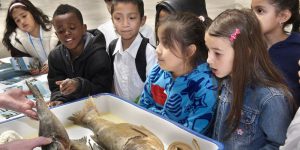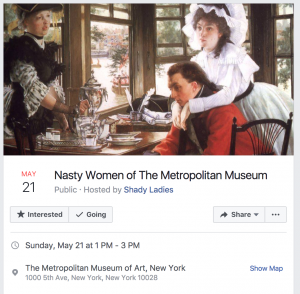When I was a kid, museum field trips were the highlight of my school year. I had the privilege to grow up in a city full of museums of all kinds and privileged enough to go to a school that could afford field trips. I know I was not alone in loving museum trip but I also was not the majority. My brother, in particular, hated museum field trips for him they were full of uncertainty and stress. For me, museum trips both in and out of field trips offered an alternative way of thinking about knowledge that excited me. Museums let me think about knowing and facts through objects and video and display rather than textbooks and lectures. By presenting museums as exciting opportunities for knowledge and engagement to kids we are creating a future for museums that will continue field trips and rainy day excursions.

And the way to engage these kids is with museum education that is relatable and interesting. When museum educators work with teachers to develop curriculum and programming that dovetails with classroom work it shows kids that their learning and knowledge can extend outside of the classroom walls into the world around them.
But it is important that our museum education programming doesn’t just replicate what is in the galleries. Programming should complicate and expand the exhibits and ask patrons to think beyond the objects on display. And sometimes this programming has to come from outside of the institutions themselves, often they are too entrenched in their own histories and paradigms to really critique themselves.
This is where organizations like Museum Hack come in. Museum Hack runs renegade museum tours in major museums like the Met but outside of the structure of the Met. They take you through the museum focusing on often lesser known exhibits and integrate information about the history of the museum alongside the objects themselves. These kind of tours as well as others led by un-affiliated academics open up new ways of reading museums that engage with different histories.

Through creating museum education programming that engages a diverse audience we can build a future for museums that is more accessible and critical of the structures that have created them. We can interrogate the colonial histories of museums as collecting institutions and set our future apart from these practices but within that history. Museums will never be fully separate from this colonial past but by changing how we talk about museums with kids and how we introduce museums to kids we can create a culture of criticism around the museological legacy.
Further Reading:
Why Should Schools Visit Museums?
http://museumtwo.blogspot.com/2014/12/how-museum-hack-transforms-museum-tours.html
http://www.aam-us.org/docs/default-source/center-for-the-future-of-museums/building-the-future-of-education-museums-and-the-learning-ecosystem.pdf?sfvrsn=2
